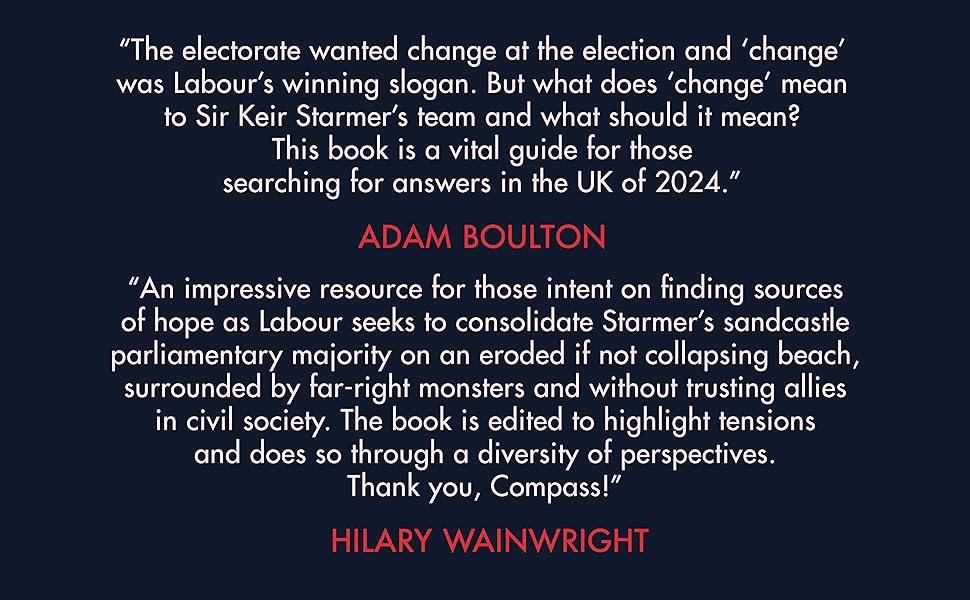The election of the first Labour Government after fourteen years of Tory rule is a huge moment – as is the scale of its challenges; the state of society, public services and the economy, and the anxieties, fears and worries faced by millions in their everyday lives.
This is the backdrop to the publication of Britain Needs Change: The Challenge of Hope and Labour’s Challenge – the first comprehensive centre-left analysis post-election of the state of Britain, the context in which Labour governs and the prospects for progressive change, edited by myself and Simon Barrow in association with Compass – and launched at the Compass AGM on Saturday past.
It brings together over two dozen UK and global thinkers, writers, experts and campaigners asking among other things – can Labour with its fragile popular majority make the UK fairer and better? Can it challenge the forces of reaction and privilege? And can it govern progressively in such turbulent times and navigate the challenges of anti-incumbency, populism and Trumpism?
First and foremost, as the book sets out to discuss, the difficulties need to be addressed. These include the lack of investment in public services; the corrosion of the public realm; the broken nature of what passes for a social contract between government and citizens, and the misery, hardship and anxiety evidenced in the huge mental health crisis, and the number of people on long-term sick and NHS waiting lists.
Adding to this is the limited agenda of Keir Starmer and Rachel Reeves which has become increasingly apparent in their first months in office. Neither are natural politicians – the first previously an administrator and the second a technocrat before becoming MPs, and neither are compelling speakers and parliamentarians.
The problem of the UK political centre
This magnifies more deep-seated problems. These include the nature of the UK political centre, which is not aided by how Starmer and No. 10 Downing Street understand the culture of Whitehall – examined by Sue Goss in her contribution. She surveys a centralist culture which is not about delivery, but talking, writing and pulling levers which are not directly connected to action.
The UK’s established institutions have for decades misread and misunderstood the nature of the UK. Thatcherism may have centralised, but so too did New Labour, despite its action on devolution. Both embodied a unitary state notion of power – undivided, absolutist, clinging to the behemoth of parliamentary sovereignty and the myth of the omnipotent centre.
This completely misrepresents the tapestry of the UK, its nature as a union of four nations and the fact that it is actually a union state – a hybrid composed of different traditions and histories. The unitary state idea of Britain which underpins not just the Tories and Brexit, but traditionally Labour, is increasingly at odds with a UK which has devolved administrations and mosaic of regional government and mayors in England. But to this day does not address the nature of the UK political centre.
Labour’s missing story of Britain and missing project of government
The absence of a compelling story about what Britain is, and could be, also reinforces this deficit. In the past, Labour under Attlee and Wilson had a story about the power of collective agency and of lifting people up and out of poverty and providing greater opportunities – informed by a philosophy and practice of equality, enlightenment and emancipation.
That Labour voice of optimism and hope has been missing for several decades and the void and uncertainty that are left without it can be seen in nearly everything the government does. It is tough to articulate a convincing centre-left story about Britain that addresses the nature of the political centre, power – and reflects the diversity and pluralism of the UK. Such a narrative could recast in a new light those time-honoured principles that Labour stood for – and should still do – but without such a story and purpose Labour will struggle.
This missing story of Britain links to a wider absence of any animating project for the Labour Government as a whole. Former Labour MP and minister Jon Cruddas noted this at the Compass event observing that ‘Attlee and Thatcher had obvious projects which informed their government’ concluding on Starmer that ‘no UK government that I know of has invented such a mission and purpose while being in office.’
A major factor is the ideological take of the hard right now emboldened in the Tories, Farage’s Reform UK and the ecology of right-wing media. Despite the failures of fourteen years of Tory rule, Brexit and Thatcherism, they have swallowed completely their own hype and still believe their own simplistic mantras which they regularly punt with complete self-confidence.
The right tell us every day that ‘government should get out of the way of business’ and that the state, regulation and taxes are suffocating the ‘animal spirits’ of entrepreneurialism. The Daily Telegraph’s Tim Stanley recently said that ‘the UK economic model is clearly broken’ describing it as an allegiance to ‘low wages, low investment and deregulation’ without one iota of self-awareness that this is the very model which he and the Telegraph have been advocating for years. Yet what this effortless self-confidence does, despite the appalling results it has produced, is give them the dominant political story and cut-through – aided by Labour’s defensiveness and absence of a compelling story.
How can social democracy and the centre-left find a new project, purpose and language in such circumstances? We must start by acknowledging where we are, and the politics of retreat and accommodation with which Labour and the left have engaged for decades while knowing there are no answers in simplistic left-wing solutions.
An essential central strand is to think about the economy, political economy, prosperity and wealth in ways which do not attempt to keep alive that ‘broken UK economic model’. There is no gain for Labour in clinging to the wreckage of such a discredited order, given its dismal results, and doing so will merely hem in the Labour administration and allow its terms of reference to be dictated by a right hungry to burn down the last vestiges of the social contract. Britain Needs Change explores this with contributions from economists Ann Pettifor and Mariana Mazzucato as well as a discussion between global historian Adam Tooze and The Guardian’s economic correspondent Aditya Chakrabortty.
Labour cannot cling to ‘normalcy’ and ‘stability’
The new Labour government also has the challenge of the wider international climate – from global instability to numerous ongoing conflicts, populism and the incoming Trump administration. All point to as Andrew Gamble explores in his contribution a diminished Britain on the international stage which has undermined its relationship with the EU via Brexit, no longer has the illusion and crutch of the so-called ‘special relationship’ with the US and has seen the Cameron-Osborne pursuit of ‘a golden age’ of doing business with China reduced to rubble.
This provides an opening: of a Britain shorn of delusions finally breaking free of post-imperial pretensions and grandeur. A UK which accepted and celebrated its role as a mid-ranking affluent state and acted accordingly. It could even be a liberation from the constant fantasies of the right of a swashbuckling, buccaneering ‘global Britain’ which was at the heart of Brexit.
In this age of uncertainty and change there is a major opportunity for Labour and the battle of ideas. Labour and the centre-left have to dare to break away from the mindset of clinging to ‘stability’ and ‘normalcy’ and longing to put back together a broken economic, social and political system, and think and act differently.
The forces of the ideological right are, despite their failures in office and inadequacies in their ideas, increasingly disruptive, opportunistic and presenting themselves as the agents of change. They will shout as loud as they possibly can that ‘Britain is broken’ and that they have the solutions to fix it.
Labour cannot abandon that territory unchallenged to the right. It cannot appear as the custodians of the status quo and existing order, or it will live to regret the hold of the forces of conservatism and caution within its leadership, ranks and wider political system which it has listened to for too long.
No one should pretend there are easy, simple answers and political solutions. But Labour need to use the current climate of uncertainty, anxiety and disruption to tell a new tale of change – about itself, the future of Britain, and about all of us. People need to be able to recognise themselves – and see themselves as active agents – within that story.
Britain Needs Change contributes to that debate and to a discussion which must involve as many of us as possible – and in which Compass can play a key role. Safety-first politics, centrism and administrative managerialism, no matter how well-intended are not going to be sufficient in the age we live in.
Labour are going to have to leave their comfort zones, caution and conservatism, and navigate a path through stormy waters. To do that they will need a sense of direction, story and project about what this government is about, otherwise they will be buffeted about by hostile forces and a populist right selling a simplistic set of stories.



